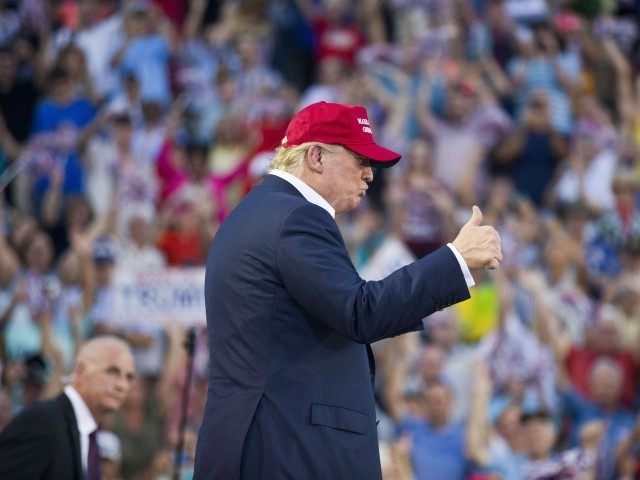WASHINGTON, D.C. (AP) — Republican presidential front-runner Donald Trump continues to demonstrate a wide base of support, riding record turnouts to seven victories out of the 11 states where Republicans cast Super Tuesday ballots.
Exit polls conducted for the Associated Press and other media across nine of the states showed Trump drawing significant support across educational, ideological, age and income classifications. Perhaps most important for Trump: Even among voting groups where he was weakest, he maintained enough strength to deny Sens. Ted Cruz and Marco Rubio any chance of catching him.
It was a repeat of the billionaire businessman’s performance in February, when he won three of the first four nominating contest. On Tuesday, he added states as disparate as Vermont, Virginia and Alabama to his win column.
“We have expanded the Republican Party,” Trump gloated Tuesday night in his victory speech.
Indeed, Republicans vote totals exceeded 2012 primary numbers in every state but Vermont. Certainly, several states held later primaries four years ago, drawing less interest. But some increases were nonetheless eye-popping: 386 percent in Virginia, 261 percent in Arkansas, 154 percent in Tennessee.
Turnout was up even in states Trump lost, almost doubling for Cruz’s win in his home state of Texas and more than doubling in Minnesota, which gave Rubio his only victory thus far.
Republicans relished pointing out Democratic primary turnout is down from their last competitive nomination fight in 2008.
That’s not necessarily a harbinger of the things to come in November, as GOP voters and party leaders remain openly split on whether the bombastic billionaire is a worthy standard-bearer. But, for Trump’s immediate purposes, any Republican establishment hand-wringing appears no match for the widespread voter discontent driving his success.
Republican voters who said they were dissatisfied with the way the government is working, rather than angry, were less likely to support Trump, and GOP voters were about split between dissatisfaction and anger with the government. Yet Trump still narrowly topped Cruz and Rubio even among voters who described themselves as merely dissatisfied.
Trump also beat his rivals among self-described moderates and those who said they were only “somewhat” conservative. Cruz held an advantage among those who were “very conservative,” but there have not been enough of those voters for the Texas senator to overtake Trump.
Nonwhite voters were less likely than white voters to support Trump, but they accounted for just 13 percent of the GOP primary voters across the nine states.
Voters’ comments suggest Trump does have weak spots, but it remains unclear which candidate, if any, stood to gain.
Nearly half of primary voters who decided who to support before the last month went for Trump. Just 27 percent of those deciding within the past month supported Trump, but that was about equal to Cruz and Rubio.
Voters under 30 were less likely than older voters to support Trump, but they were about equally likely to support him and Rubio.
Four in 10 voters said they prefer the next president have political experience, but Cruz and Rubio were drawing relatively equal support from those voters, and even John Kasich was supported by about 1 in 10 of them.
Voters without a college degree were significantly more likely than those with one to support Trump, but neither Rubio nor Cruz could pull ahead of Trump among those with one.
Trump also did best among the least affluent voters — those in households making less than $30,000 a year. Cruz pulled even among middle income voters in households making between $50,000 and $100,000 a year, while Rubio did best among those in households making more than $200,000 a year.
Among Democrats, Hillary Clinton continued to post a wide advantage over Bernie Sanders among non-white voters, the key to her victory margins in states like Georgia and Texas.
Clinton, who campaigns as a “pragmatist” against the more liberal Sanders, also was the beneficiary of a Democratic electorate that prefers a more centrist tack.
According to the exit polls, majorities of Democratic voters in Alabama, Georgia, Tennessee and Virginia wanted a continuation of President Barack Obama’s policies rather than a more liberal direction, along with nearly half in Arkansas, Massachusetts and Texas and about 4 in 10 in Oklahoma. About a third of voters or fewer in each of those states wanted a more liberal direction.
Of all those states, Sanders won only in Oklahoma.
The polls were conducted by Edison Research as voters left their polling places at 20 to 40 randomly selected sites in nine states. Preliminary results include interviews with 821 to 1,491 Democratic primary voters and 536 to 1,943 Republicans primary voters in each state contest. In Arkansas, Georgia, Tennessee and Texas, the results also include telephone interviews early and absentee voters.
The results among all those voting in each contest have a margin of sampling error ranging from plus or minus 4 percentage points to plus or minus 5 percentage points.

COMMENTS
Please let us know if you're having issues with commenting.